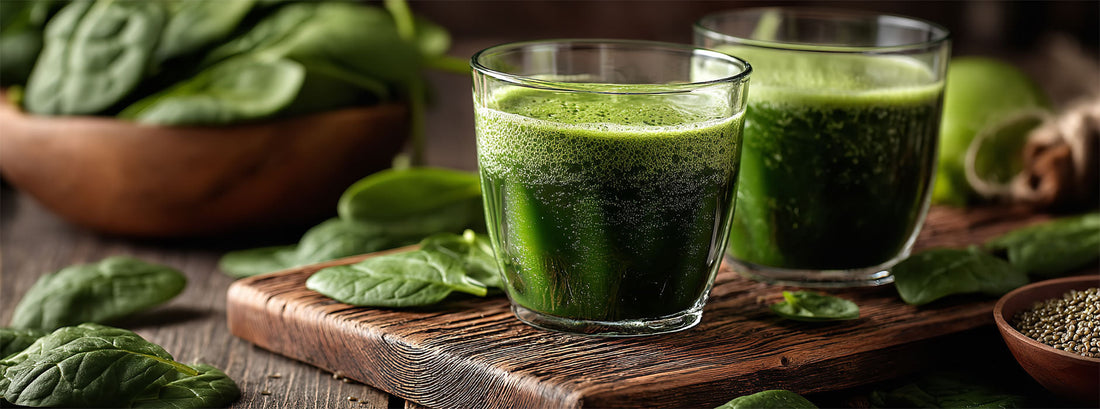
Psoriasis Diet: Foods to Avoid & Eat
Share
Living with psoriasis can be challenging, but there’s growing evidence that your diet can make a significant difference. The right foods may help reduce inflammation, support gut health, and improve your skin, while the wrong ones can trigger flare-ups. If you’re wondering what to eat and what to avoid, this comprehensive guide will walk you through it.
Psoriasis and Gut Health
More and more research is linking psoriasis and gut health, showing that what happens in your digestive system doesn’t stay there. It affects your entire body, including your skin.
A study published in Frontiers in Microbiology highlighted how individuals with psoriasis often have an imbalanced gut microbiome, sometimes referred to as “leaky gut”. This imbalance may lead to increased inflammation throughout the body, which can trigger or worsen psoriasis symptoms.
Supporting a healthy gut through diet, probiotics, and anti-inflammatory foods can help manage your condition naturally.
Foods to Avoid with Psoriasis
Certain foods are known to trigger inflammation and immune responses that may aggravate psoriasis symptoms. If you’re crafting a psoriasis diet plan, these are the top offenders to avoid:
-
Processed Foods: High in trans fats, refined sugars, and additives that fuel inflammation.
-
Red Meat and Processed Meats: Can increase inflammatory markers like C-reactive protein (CRP).
-
Dairy (especially milk): Contains casein, which may trigger inflammatory responses in some individuals.
→ Is milk bad for psoriasis? Many people with psoriasis report flare-ups after consuming milk or cheese, so it's worth testing dairy elimination. -
Alcohol:
Can drinking alcohol cause psoriasis? Yes, excessive alcohol disrupts immune function and may trigger or worsen psoriasis flares. -
Nightshade Vegetables: Such as tomatoes, peppers, and aubergines, contain solanine, which some believe can worsen symptoms.
-
Gluten: Those with a gluten sensitivity or coeliac disease may see improvement after removing wheat, barley, and rye.
Foods to Eat for Psoriasis
The best diet for psoriasis is rich in anti-inflammatory and gut-healing foods. Focus on these skin-supportive choices:
-
Fatty Fish: Salmon, sardines, and mackerel provide omega-3 fatty acids that reduce inflammation.
-
Fruits and Vegetables: Berries, leafy greens, and carrots are rich in antioxidants and fibre. To boost your intake effortlessly, try Blended Greens superfood juice, packed with nutrients that nourish skin and support immune health.
-
Whole Grains: Brown rice, quinoa, and oats support digestion and overall health.
-
Nuts and Seeds: Flaxseed, walnuts, and chia are great sources of healthy fats.
-
Fermented Foods: Sauerkraut, kimchi, and kefir help balance the gut microbiome.
-
Fresh Wheatgrass Juice: A natural source of chlorophyll, vitamins, and enzymes. Wheatgrass juice is a popular choice among many psoriasis or eczema sufferers for its gentle detoxifying and alkalising effects.
What is the Best Diet for Psoriasis?
There is no one-size-fits-all approach, but an anti-inflammatory, gut-friendly diet is widely recommended. This often includes:
-
Eliminating processed foods, sugar, and alcohol
-
Prioritising highly nutritious plant-based, whole foods or juices
-
Supporting gut health with probiotics and prebiotics
Psoriasis Detox Diet
A psoriasis detox diet focuses on flushing out toxins and calming inflammation through clean, nutrient-dense foods and powerful plant-based juices.
Britt’s Organic Wheatgrass Juice is a fantastic addition to any psoriasis detox. Grown organically, outdoors and flash-frozen for maximum potency, our wheatgrass juice provides the micronutrients your skin craves naturally.
Before and After Wheatgrass Juice for Psoriasis
One of our customers experienced a dramatic improvement in her psoriasis after drinking Britt’s Organic Wheatgrass Juice daily. Redness, itching, and flare-ups significantly reduced, and her skin appeared visibly calmer and clearer (see her before-and-after photo). Wheatgrass is rich in chlorophyll, antioxidants, and skin-loving nutrients like vitamins A, C, E, and zinc. It helps detoxify the body, reduce inflammation, and support gut health — all key factors in managing psoriasis naturally.

Frequently Asked Questions
Are eggs bad for psoriasis?
Eggs are high in arachidonic acid, a type of fat that may trigger inflammation in some people. While not everyone with psoriasis reacts negatively to eggs, consider reducing or eliminating them if you notice flare-ups.
Can drinking alcohol cause psoriasis?
Yes. Alcohol can weaken the immune system, increase inflammation, and even reduce the effectiveness of psoriasis treatments. Limiting alcohol or avoiding it altogether is often recommended.
Is milk bad for psoriasis?
Many people with psoriasis report sensitivity to dairy, particularly milk, due to its casein and lactose content. Try eliminating milk for a few weeks to see if your symptoms improve.
Take Control of Your Skin Health
Proper nutrition plays a powerful role in managing psoriasis, yet many of us are overfed but undernourished. We consume too many calories and not enough vitamins, minerals, and phytonutrients that the body and skin need to thrive.
Did you know that low iron and vitamin D levels are often linked to poor skin health, including psoriasis and eczema? These deficiencies can worsen inflammation, disrupt immune function, and delay healing.
With Britt’s Superfoods Home Test Kits, created in partnership with Silex, you can check your levels from the comfort of home and take targeted action to support your wellbeing:
Once you know what your body needs, you can nourish it properly with our range of organic, plant-based superfood juices.
Feel better in your skin with the power of nutrition. Discover our Wheatgrass Juice and Blended Greens to start your psoriasis diet the right way.
The information provided on this blog is for general informational purposes only. Our superfoods are intended to support a healthy lifestyle and are not a substitute for professional medical advice, diagnosis, or treatment. They are not intended to prevent, treat, or cure any medical condition. Always follow the guidance and treatment plan prescribed by your doctor or healthcare provider.

